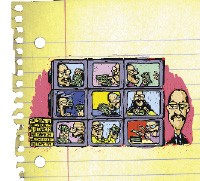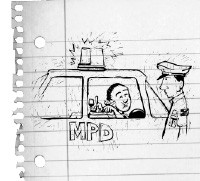When, as virtually the last matter taken by the prosecution in former state senator John Ford‘s Tennessee Waltz trial, a $50,000 Rolex watch came into evidence, Ford and his support group, which included numerous members of his immediate and extended families, seemed of good cheer.
As was chronicled here last week, Ford felt sunny enough after that day’s testimony to engage in banter with the two FBI agents, Mark Jackson and Brian Burns, who had testified to being the originators of the entire Tennessee Waltz sting — the means whereby Ford and several other state legislators and other public officials had been induced to accept money in return for legislative favors.
If the watch — a gift from developer Rusty Hyneman that prosecutors were attempting to use as “predication” (proof of Ford’s disposition toward corruption) — had an outer-space element (it was partly made of material derived from a meteorite), so had the sting devised by Jackson and Burns and acted out by three other principals, FBI agents “L.C. McNeil” and “Joe Carson” (the names were pseudonyms) and undercover informant Tim Willis.
The premise of the sting was that a computer-recycling firm calling itself E-Cycle (it was an FBI shell company, as things turned out) needed expert assistance from the likes of Ford and was willing to pay for it — in the senator’s case, to the tune of $55,000.
Aided by defense attorney Mike Scholl, Ford felt that he had a strong prospect for nothing worse than a hung jury (indeed, Scholl would base his closing argument on an appeal to each juror to “act as an individual”).
The very fact that he felt like engaging in humorous asides with the professed architects of his then-pending peril was evidence that Ford and his supporters saw the predication case to be weak enough that he might indeed catch a break from one or two jurors.
Evidently Ford was right, but not right enough. When jurors fell to deliberating on Wednesday, following closing arguments, they did deadlock on the charge of extortion — an indication that Scholl’s claim of entrapment had found some sympathetic ears.
Equally tenuous were the three counts of witness intimidation — all ultimately resulting in not-guilty findings, at least partly because the main witness against Ford on that count, Willis, had seemed disingenuous or worse during a hard day of cross-examination by Scholl.
But the charge of bribery was buttressed by what seemed an endless series of videotapes showing Ford being handed money — $55,000 altogether — by McNeil, who had made sure to connect the payoff to specific talk about legislative action by Ford.
Ford’s mood had conspicuously turned gloomy by Thursday afternoon, when jurors and other trial principals were reconvened to hear Judge Daniel Breen‘s ruling on a definition requested by the jury: What precisely was the meaning of the term “under color of official right”?
When the judge ruled that it referred to actions by a public official, the feeling had almost palpably spread to all followers of the trial that some tide had turned against Ford. In fact, the question had to do with the extortion count, but its import was more general, and, as it turned out, there was no disagreement among jurors on the bribery charge.
Whatever sentiment there was that racial or political factors might have influenced the Tennessee Waltz prosecution (and on the latter score there was and is a considerable amount of suspicion; see City Beat, p. 14), the jury of six blacks and six whites did its duty by the evidence confronting their eyes and ears.
Hypothetically, all of this could come undone in the course of some appeal. In any case, John Ford has very little in the way of a breathing spell. Though he remains free on bond, he is up for trial again next week in Nashville, on charges relating to accepting money in return for legislative favors — this time on behalf of a real company.
• Shelby County assessor Rita Clark, the Germantown homemaker and Democratic activist who surprised herself and everybody else by winning her maiden political race in 1996, then went on to win twice more, won’t run again in 2008.
Clark announced her decision to members of the Shelby County Commission during budget hearings on her department Monday morning.
Asked to accept a 5 percent cut for the next fiscal year, Clark declared such a thing “impossible” and then went on to tell the commissioners she would not run for reelection and didn’t want to saddle her successor with a departmental budget that was too small.
Elaborating on that later on, Clark said, “My budget now is the same as it was when I came into office. There’s no way we could continue to provide an appropriate level of service with less.”
Although she had worked in other candidates’ political campaigns, Clark had never made a race of her own until 1996, when the late Democratic eminence Bill Farris prevailed on her to run against incumbent assessor Harold Sterling.
Clark was widely regarded at first as a pro forma candidate — someone to maintain her party’s presence on the ballot. She ultimately proved to be much more — fighting a hard mano-a-mano campaign against Sterling by questioning his hiring of a personal trainer and an out-of-county assistant.
She won in an upset, going away, and in the process her continued success suggested to many Democrats that, all other factors being equal, someone of her race and gender made an ideal countywide candidate.
To date, no other Democrat — except for Mayor A C Wharton — has been able to crack the Republican monopoly on countywide offices.
Commenting Monday on her decision not to seek reelection next year, Clark cracked wryly, “It’s just time. I’m afraid if I ran again, my husband would oppose me. And I couldn’t beat him.”
• Both Democratic candidates for the vacant District 89 state House seat, Kevin Gallagher and Jeannie Richardson, held campaign fund-raiser/receptions last week, as that campaign begins to mount in earnest. Two Republicans are also competing for their party’s nomination: Wayne McGinnis and Dave Wicker Jr.
Responding to at least one Gallagher supporter’s published skepticism concerning her residence (and the identity of her Midtown housemates), Richardson, a former inhabitant of Mud Island, said, “The people who live here with me are my son, my daughter, and my granddaughter, and I do hope they’ll all be active in my campaign.”
Both parties’ special primaries will be held May 31st, with the two winners facing each other in a July 17th general election.
• Still feeling their oats are a group of local Memphis bloggers who have been sought out of late for audiences by political figures like state Senate speaker pro tem Rosalind Kurita (D-Clarksville) and Memphis mayoral candidate Herman Morris.
Now, the group, whose efforts are pooled under the umbrella site memphisliberalblogosphere.blogspot.com, have been asked for another sit-down — this time by teacher Bill Morrison, a Democrat who ran a game but ultimately unsuccessful race for Congress last year against 7th District incumbent Marsha Blackburn, one of the Republican Party’s stars.
Morrison evidently plans to take on another behemoth — this time City Council incumbent Jack Sammons.
Both Sammons and his friend and fellow Super-District 9 council member Tom Marshall are presumed to be candidates for reelection, but each is also rumored to be still considering a race for mayor.
• It is still too early to write “finis” to the mayoral field. As of Tuesday morning, 14 petitions had been pulled from the Election Commission, and only one person — former Shelby County commissioner John Willingham — had actually filed.
Incumbent mayor Willie Herenton, presumably to cover his flank, made a point this week of dispatching a letter to Shelby County mayor Wharton, his erstwhile campaign manager, advising him that “no circumstances” would prevent him from running again and adding significantly, “I trust that your support will be evident.”
Without Wharton, who is still under pressure from potential backers to make a race, the “top tier” of mayoral candidates is generally considered to consist of Herenton, city councilwoman Carol Chumney, former MLGW head Morris, and Willingham. Some regard former FedEx executive Jim Perkins as belonging in that list, and there is talk also of a candidacy by entrepreneur/businessman Darrell Cobbins.
 Greg Cravens
Greg Cravens  Greg Cravens
Greg Cravens